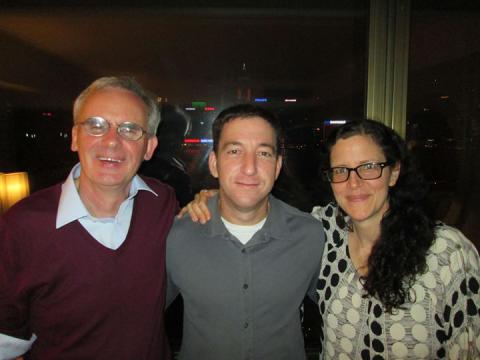The Washington Post and the Guardian/US were both awarded one of journalism's top honors on Monday—the Pulitzer Prize for Public Service— for their separate but related reporting on the NSA's widespread surveillance documents leaked by NSA whistleblower Edward Snowden.
Journalists Glenn Greenwald, Laura Poitras and Ewen MacAskill from the Guardian and the Washington Post's Barton Gellman sent shock waves across the globe for their reporting on the leaks—eliciting responses from citizens and governments alike and spurring a new era of backlash against government intrusion.
Following news of the honor, Snowden released a statement thanking the Pulitzer committee for recognizing those involved in the NSA reporting. He wrote:
Today's decision is a vindication for everyone who believes that the public has a role in government. We owe it to the efforts of the brave reporters and their colleagues who kept working in the face of extraordinary intimidation, including the forced destruction of journalistic materials, the inappropriate use of terrorism laws, and so many other means of pressure to get them to stop what the world now recognizes was work of vital public importance.
This decision reminds us that what no individual conscience can change, a free press can. My efforts would have been meaningless without the dedication, passion, and skill of these newspapers, and they have my gratitude and respect for their extraordinary service to our society. Their work has given us a better future and a more accountable democracy.
The Pulitzer committee awarded the prize to the publications for their "revelation of widespread secret surveillance by the National Security Agency," specifying that the Guardian, "through aggressive reporting," helped "to spark a debate about the relationship between the government and the public over issues of security and privacy." They credited the Post for their "authoritative and insightful reports that helped the public understand how the disclosures fit into the larger framework of national security."
The Guardian team broke the first report on the NSA's collection of Verizon phone records and Gellman, with help from Poitras, reported on the wide-ranging surveillance program known as "PRISM." In addition to Greenwald, Poitras, MacAskill and Gellman—who are primarily credited for the NSA revelations—a number of other reporters working at the publications also contributed to the reporting that followed.
Following the announcement, many hailed the selection as a vindication of the actions of both the journalists and the whistleblower, a number of whom have been threatened for their work and are forced to remain in exile for fear of persecution by the U.S. government.
“The stories that came out of this completely changed the agenda on the discussion on privacy and the NSA,” David Remnick, editor of The New Yorker, said prior to the announcement. “There’s an enormous public good in that, and it’s yet to be proven at all that somehow did great damage to national security.”
"I can't imagine a more appropriate choice for a Pulitzer Prize," New York University media studies professor Mark Miller told AFP. Miller said that the winning team of reporters did what "American journalists are supposed to do, which is serve the public interest by shedding a bright light on egregious abuse of power by the government."
"The real journalistic heroes in this country tend to be the mavericks, the eccentrics, those who dare to report stories that are often dismissed derisively as 'conspiracy theory,'" Miller continued.
On Friday, Poitras and Greenwald returned to the U.S. for the first time since breaking the NSA stories to accept the prestigious George Polk Award for national security reporting.
During his acceptance speech for the George Polk award, Greenwald discussed the intimidation that both whistleblowers and journalists face.
"The only way to deal with threats," he said, "is to just do the reporting as aggressively, if not more so, than you would absent those threats."
_____________________


Spread the word